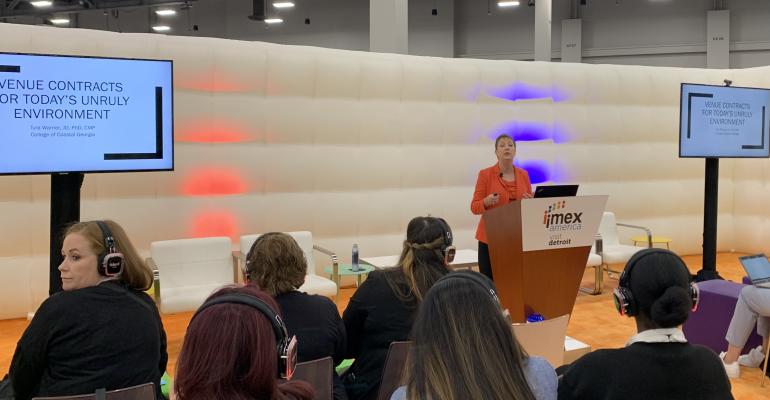When it comes to event contracting, “I’ve never seen less working together” between planners and suppliers than right now, said Tyra Warner, department chair for hospitality, tourism, and culinary arts at the College of Coastal Georgia, during a packed breakout session on the show floor at IMEX America in Las Vegas this week.
Warner—an attorney who has represented countless meeting groups over the years—told the roughly 80 session attendees that “most of the planners I’ve spoken with lately feel it’s a sellers’ market, and that there is often a ‘take it or leave it’ feeling coming from hotel sales reps” regarding the terms of meeting-contract proposals.
However, Warner noted that one reason this might be the case in the post-pandemic environment: “So many salespeople are new in their jobs because of the ‘Great Resignation’ and they simply are not aware of what they can change in event-contract proposals, or what they can take to their bosses to see what can be changed.”
As a result, Warner suggested several ways for planners to operate as they conduct site selection and negotiating so that they get what they need for their meeting to succeed while staying within budget and minimizing contractual risk.
In proposals and negotiations, lead with your event’s strengths. Warner told attendees to answer this question before engaging a property’s sales rep: What benefits does your event bring to that property? “Right now, you are competing for space with other events, and strong histories are not nearly as relevant as they were before the pandemic,” she said. “So, what else do you have to trade on?”
Elements that planners can leverage include an event’s date pattern, a multi-event deal, a strong food and beverage minimum, and other things that will help the event stand out from others looking at that property.
Think differently about attrition. “Securing bigger blocks with larger slippage rates is not really working right now,” Warner said. “You could negotiate smaller blocks but with a clause that allows you to add rooms later at a slightly higher rate. This keeps you safe from attrition issues, while helping your attendees who tend to register within the final few weeks.”
If the room block is large, a planner could put a few block-review dates in the contract, which gives the hotel an opportunity to take some rooms back in time to sell them to non-attendees.
And to make sure a group is getting block credit for all the attendees who book into the property regardless of when and how they do so, a planner could add an audit clause in the event contract. You might get some pushback from the property, but this is an issue you should fight hard for,” Warner said. “And there should be no charge for the audit!”
Lastly, to make sure an audit is fully accurate, planners could ask their attendees to list on their registration form the hotel they are booked into.
Don’t get fixated on working with a particular property. “If you are not getting your RFPs or proposed contract changes returned to you in a timely manner, let the property know that you have the business out to other properties and give a deadline for their answers,” Warner advised. “Can you source two hotels at the same time for one event? Absolutely. It is more work for you, but it can help you get answers or get better terms. However, don’t bluff—in this market, the hotel just might say, ‘Okay, go with the other property this time,’ and then you are in a bind.”
Add hotel-performance clauses. “In the contract, specify the staff levels you want at key moments, such as peak check-in times, meals, and receptions,” Warner said, recommending that planners refer to the suggested personnel numbers for each meeting element that’s found in the Event Industry Council’s planning manual. Further, “you must have a ‘what-if’ clause in the contract so you know the damages owed in case the property cannot provide the staff numbers in the contract. Will you accept a free reception, or a discount off the master bill, or something else?”






